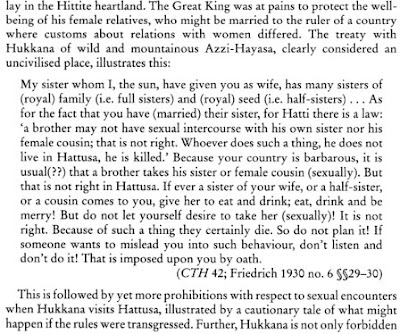chukot of those of Egypt or Canaan which one should not engage in, compared with the chukot of Hashem, in pasuk 4, which one should follow?
Ibn Ezra has an attempt:
ובחקתיהם לא תלכו -
שלא ירגיל אדם ללכת בדרך הזה עד שיהיה לו חק.
But Ramban quotes Ibn Ezra:
ג): ועל דעת ר"א (לעיל יז טז):הזכיר כמעשה ארץ מצרים - על השעירים הנזכרים, וכמעשה ארץ כנען - על העריות שהיו הכנענים בהם רעים וחטאים, כאשר אמר בסוף (פסוק כז): כי את כל התועבות האל עשו אנשי הארץ.
ועל דעת רבותינו בתורת כוהנים (אחרי ט ג):היו גם המצרים שטופים בזימה בכל העריות ובזכור ובבהמה.והוא האמת, כי גם קדש היה בארץ בזכור מאז ועד עתה. והכתוב מעיד בהן, בני מצרים שכניך גדלי בשר (יחזקאל טז כו), ואומר אשר בשר חמורים בשרם וזרמת סוסים זרמתם (שם כג כ). והבשר כנוי, וכן זב מבשרו (לעיל טו ב), דם יהיה זובה בבשרה (שם פסוק יט
Rashi explains it to mean customs, or superstitious practices, and explains why refer to them as law:
| and you shall not follow their statutes: What did Scripture omit [until now] that it did not state [and includes in this clause]? However, these are their social practices, things that assumed the status of law (חָקוּק) for them, for example, [certain days set aside for attendance at] theaters and stadiums. Rabbi Meir says: These [practices referred to here,] are the “ways of the Amorites,” [the superstitious practices] enumerated by our Sages. — [see Shab. 67ab; Torath Kohanim 18: 139] | ובחקתיהם לא תלכו: מה הניח הכתוב שלא אמר, אלא אלו נמוסות שלהן, דברים החקוקין להם, כגון טרטיאות ואצטדיאות. רבי מאיר אומר אלו דרכי האמורי שמנו חכמים: |
But -- and here we finally get to the point I was trying to develop -- Shadal as a pashtan would like this to be a statute, that is, instituted law, at some point. Thus,
ג ובחקתיהם לא תלכו : בכל התועבות הנזכרות לפנינו לא מצאנו ענין שיהיה חוק אלא העברת הבנים למולך . ונראה כי כמו שהייבום הוא חוק אצלנו , כך קצת מן העריות היה חוק אצל האומות ההן על פי תנאים ידועים .
The only "statute" in context would possibly be sacrificing children to Molech, but chukot are mentioned in plural! He suggests that for some of these close family members, there might be something akin to yibbum, where under certain circumstances, the law dictates a marriage. And thus, this would be a statute. I would interject here that we see Yehuda performing yibbum on Tamar, his daughter-in-law, who should otherwise be prohibited; and we have, according to Ramban, customary Yibbum that Boaz performs on Rut in megillat Rut. One could imagine statute in other cases, where it is not necessarily yibbum after a death of a husband, but in other situations as well.
I would add an alternative; by Canaanite law, there might be no statute requiring a marriage, but within their set of laws, these particular relationships might not be forbidden. As such, one should not conduct oneself in accordance with their statutes, which do not forbid these, but rather with Hashem's statutes.
Consider the following, from Ancient Near East C. 3000-330 BC, By Amélie Kuhrt.
"As for the fact that you have (married) their sister, for Hatti {=Hittite people} there is a law: 'a brother may not have intercourse with his own sister not his female cousin; that is not right. Whoever does such a thing, he does not live in Hattusa, he is killed.' Because your country is barbarous, it is usual (??) that a brother takes his sister or female cousin (sexually). But that is not right in Hattusa, etc."This is in line with the idea I described above. What is meant by "usual?" I have not seen the original, but this language, in English, appears to echo the idea of Ibn Ezra of repetition making something as if a statute. Also, this text apparently continues by outlining all sorts of forbidden sexual relationships, which he is imposing upon this fellow by oath.
Thus, we have evidence here of differing codes of permitted vs. prohibited sexual relationships in the Ancient Near East, and in Canaan. And Hashem is laying out an Israel sexual code, and imposing it on the Israelites to the exclusion of whatever sexual conduct codes they may find already in place in Canaan. And the statutes in the code in place in Azzi-Hayasi is at odds with, e.g.:


2 comments:
Note that the Hittites whose documents are available to us are almost certainly not the Chiti of Tanach but an empire based primarily in Turkey
ah. thanks. Azi Hayasa also located in Turkey.
http://en.wikipedia.org/wiki/Hayasa-Azzi
even so, it is a good parallel, conceptually.
kt,
josh
Post a Comment